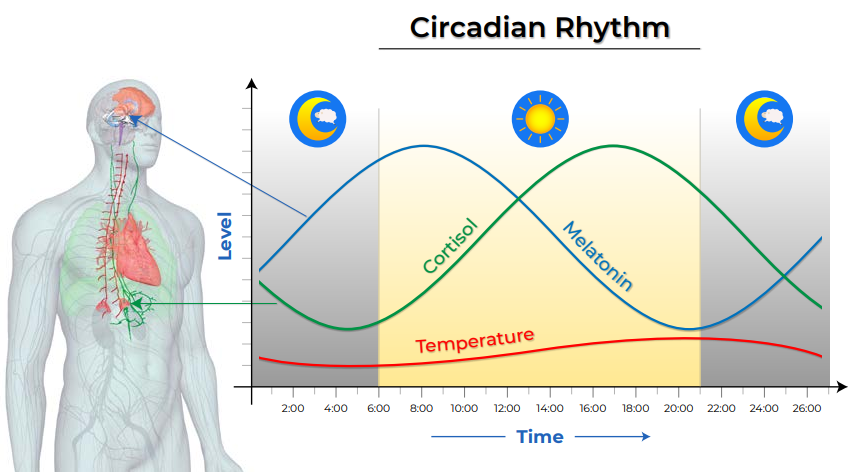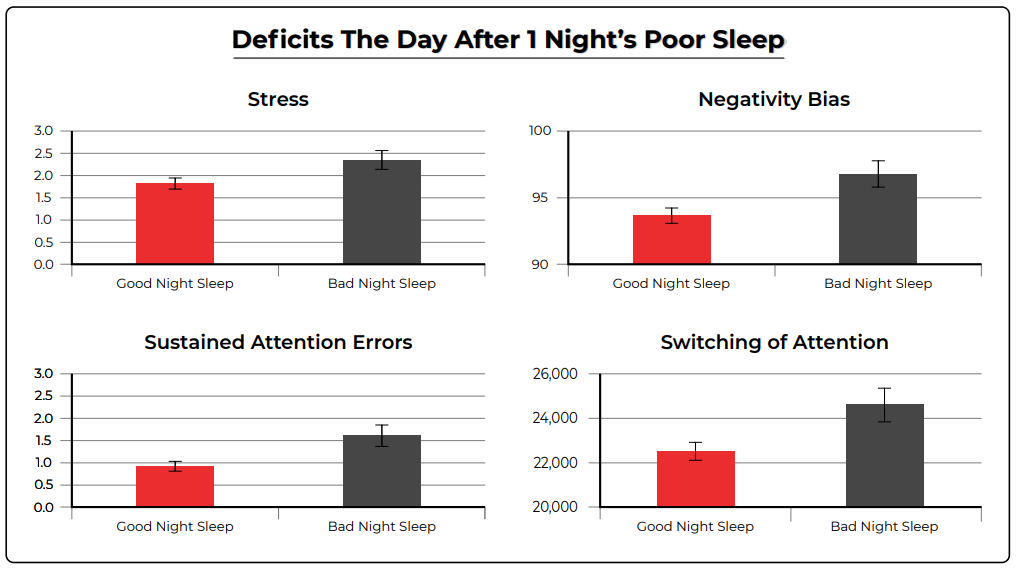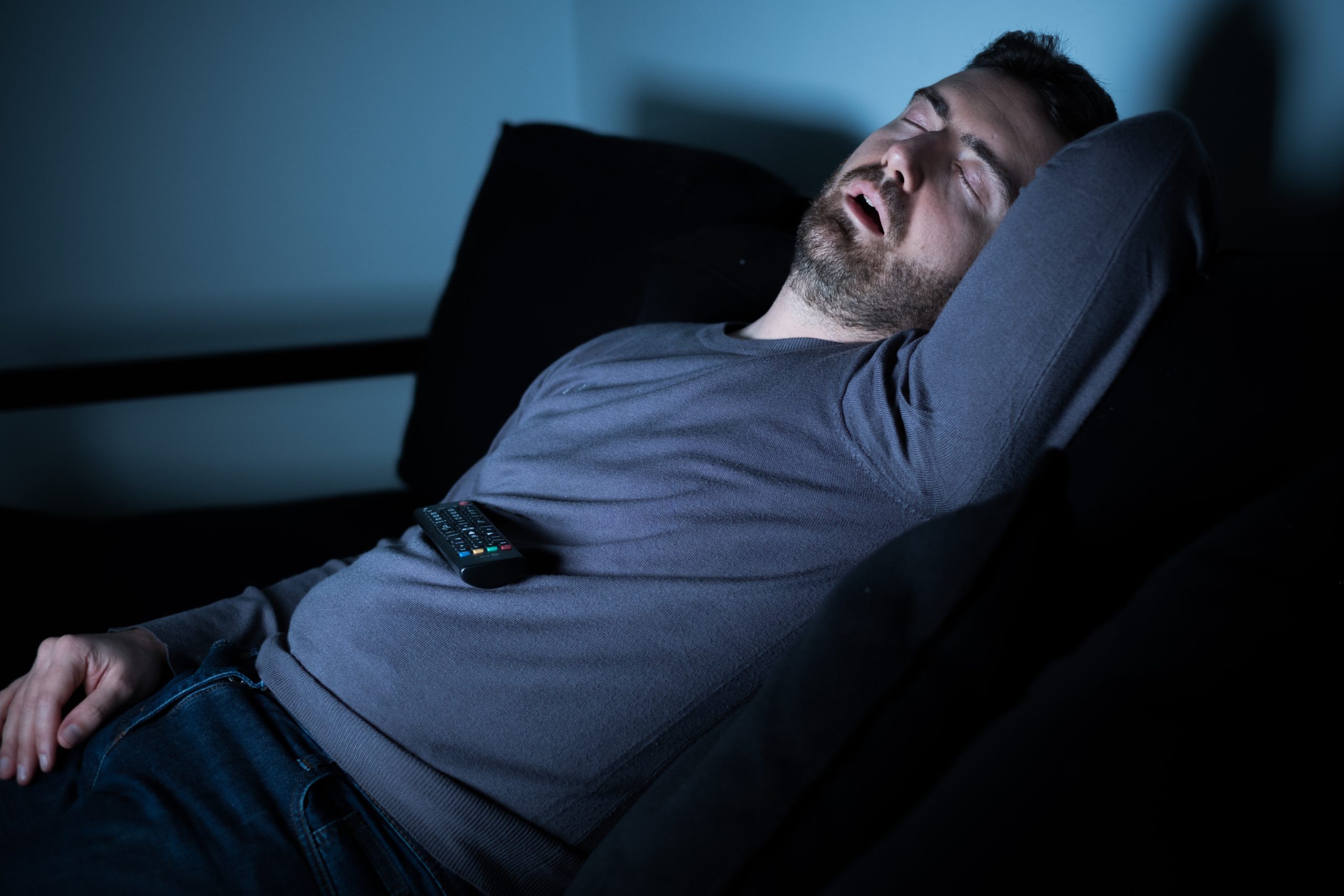
*This is an article from the Winter 2022 issue of Contentment Magazine.
By Evian Gordon MD, PhD, FAIS
Founder and Chief Medical Officer Total Brain
and
Jennifer Franklin
Founder of Totally Immune.com
Guess what? If you’re stressed, you’re going to have trouble sleeping. And you know what else? It can become a vicious cycle that will cause MORE stress and LESS sleep. But you already knew that, so let’s get into breaking that cycle and getting some darn sleep already, which, of course, will decrease your stress and enhance your well-being.
Most adults need 7-9 hours of sleep a night. There are a growing number of studies that highlight the health impact and risk of a range of diseases (from cardiac problems to depression and stroke), from less than 7 hours of sleep a night. What is a particularly telling pointer to the hazards of a cumulative chronic sleep deficit, is that even 1 night of fewer than 6 hours of sleep, has significant stress, attention, negativity, and decision-making effects the following day.1

Figure 1: Findings from the Total Brain International Database. Our team found deficits in Stress and Attention as well as enhanced Negativity, associated with even 1 night of poor sleep of fewer than 6 hours.1
Most of us want better sleep. But, where to start? It’s not only what you do before bed, but also what you do ALL day that matters.
In this article, we will cover sleep issues that are not medical, such as insomnia, which is trouble falling asleep and staying asleep. Medical sleep disorders, such as sleep apnea (paused breathing and heavy snoring due to periods of the blocked airway), need to be diagnosed and treated by a sleep specialist.
You are designed to sleep.
Your body has a 24-hour repeating sleep-wake cycle called the Circadian Rhythm.2 Simply put, it is your mental, physical, and behavioral changes across 24 hours. The environmental cycle of light and dark helps to determine your sleepiness and wakefulness. As you go about your 24-hour cycle, your body is going through many biological processes affected by the light and dark cycle.
The three most known circadian rhythms are melatonin, cortisol, and temperature. Melatonin is the primary sleep hormone that is part of the “switch” that begins your sleep cycle. Once your sleep cycle is switched on, it has a regular hard-wired cadence through the five stages of sleep (which can be disrupted by stress and other issues). A slight drop in temperature also aids at the beginning of sleep. Raised cortisol, the primary stress hormone, can be one of the factors that keep you awake, but in the morning, it helps you to wake up.
Figure 2 shows the changes in these dynamics that form an integral part of your “daily clock”. This marvelous adaptive homeostatic orchestration is readily disrupted by stress.

Figure 2: Three key processes in the 24-hour ongoing circadian rhythm that reflect our daily interconnection to light and dark. Increased melatonin and reduced temperature are part of the OFF switch to sleep. Increased cortisol is a part of the ON switch to awaken. These processes are readily disrupted by stress.
Your Circadian Rhythm can be affected by:
- Poor sleep habits – we will get into that in a moment.
- Body temperature – not too hot, not too cold, thank you.
- Eating habits – eating too much or too late, as well as alcohol and caffeine.
- Stress – you knew that was coming.
The best place to start are your pre-sleep habits. Handling sleep habits can clear up a lot of general sleep issues, such as insomnia and stress-related sleep issues. There is a lot of in-depth sleep hygiene “should-do list” info out there. Much of it comes down to routine and personalization. In this article, we will cover the framework for creating a successful sleep environment. For a more comprehensive journey or sleep reset, a sleep course or coach can further help get you back on track.
The goal of quality sleep habits is to make an ally out of your circadian rhythm. Working with nature and your hormones is ground zero and the first step to natural restorative sleep. To get to sleep, you want to increase your melatonin and decrease your stress-related cortisol, so your body gets the message that it’s time to sleep and then time to wake up.
Here are some of the ways to create conducive sleep habits:
Prepare your sleep environment. Your brain loves a routine. Safety is your brain’s first and foremost priority. Routines are safe expected outcomes that your brain and body can rely on, which decreases stress. Create a winding down time about an hour before you want to sleep.
5 Ways to Build Successful Sleep Habits
- Go to bed and wake up at approximately the same time every night and day. Brain. Safety. Routine. Check.
- Put down the devices. (OH NO, not the devices!) TV, phones, tablets, and computers all emit a strong blue light that suppresses melatonin, the hormone critical to sleep. But reading is back in style and a relaxing way to prepare for sleep. Just not Stephen King! We love Stephen King, but it can be too stimulating before bed.
- Warm shower or bath. It feels nice and there’s evidence its helpful.3 As you sleep your core body temperature drops. By taking a warm bath or shower about an hour before bed, your body will heat up and then cool down signaling to your brain it’s time to sleep.
- Clear your mind of perseverative negative thoughts before bedtime by writing things down, making a to-do list earlier in the evening, and doing what works for you in reframing the problem into a potential solution. This is helpful if you tend to worry and think too much in bed at night.
- Create a dedicated sleep room. Dim the lights. Light stimulates your wake-up hormones (cortisol) and suppresses sleep hormones (melatonin). Temperature control also signals sleep time, remember the warm shower? A cool room (60-71 Fahrenheit) is conducive to sleep. Get comfortable. Are your pillows comfortable and supportive? How’s your mattress? Think of Goldilocks, not too soft, not too firm. Do you wake up at night with clothes tangled around you? Some people find weighted blankets to be soothing and relaxing. Small changes in routine and comfort can make a big difference.
Fun fact: Your brain never stops being active. But it does need your body to sleep so it can do what it needs to do. Lack of quality sleep affects your brain as well as physical exhaustion. Memory and new associations (knowledge) are consolidated during your sleep cycle. Sleep deprivation can affect learning, reaction time (accidents), metabolic rate (weight gain), and your immune system.

Healthy Sleep Habits: How your brain can help you sleep
Now that covers the before-bed issues. But what if you are dialed in on your sleep hygiene and you are still suffering? The next step is to determine what’s going on in your daily life that can be adjusted to facilitate restorative sleep.
As stated earlier, it’s not just what you do before bed, it’s what you do ALL day that matters. It’s a 24-hour sleep-wake cycle. If your sleep issues are compounded by your daily life stress, there are steps to ease that stress and begin to tip the scales toward getting proper sleep which will, in turn, provide you with the power to get through those stressful days.
You want the stress-sleep symbiotic relationship to be on the positive side. Win-win.
Here are 5 steps to manage your daily life stress, which will pay off when you head to bed.
- Befriend Routine. As much as you can, automate your days, just like your pre-sleep evening routine. The less left up to winging it, the better. Even if your days are not routine-able, creating a schedule can eliminate stress caused by uncertainty. This in no way precludes spontaneity, but it simply provides a regular framework. Having a plan bolsters your brain’s need for safety through expected outcomes.4
- Proactive Stress Plan. Often insomnia is stress related. A well-researched and fast way to switch off your stress system is breathing at 6 breaths per minute (Resonant Breathing), to activate your relaxation response.5 There are many wonderful digital tools to help induce a calm-flexible state prior to sleep, including Neurotunes music for sleep (in TotalBrain.com) and Alpha-Stim.
- Nature. Just like our attunement to light-dark, our biological nature can be a part of belonging and meaning to the brain and body through experiencing nature. Make going outside a priority. If you have to multi-task, do it. See the sun first thing in the morning to reset your melatonin clock to its natural state. Make phone calls outside, eat a meal outside. If you have kids or pets, get outside with them. If you’re not a morning person, make the effort to get outside in the morning to stimulate cortisol and take advantage of the light to get you going.
- Move. Yes, we know, exercise is the answer to so many problems. But we said move. Just like getting out in nature is a natural human need to thrive, there can’t be enough said about challenging the sedentary lifestyle. If you’re a desk jockey, incorporating hourly movement (even a few minutes) will make a huge impact on nearly every aspect of your health. The human body is meant to move. By capitalizing on getting more movement during the day, your body will have a greater likelihood to be ready for sleep recovery at the end of your day. Moving your body is a cornerstone to managing both stress and sleep.6
- Food. Food is going to either help or hinder sleep. What you eat and drink matters for natural sleep. Alcohol may appear to help you sleep, but the quality is diminished, and the needed brain and body recovery is compromised. Although it may seem obvious, caffeine close to bedtime is not your friend either for good sleep. Even if you can sleep after a cup of coffee, it is like alcohol in that it negatively impacts restorative sleep. Without getting into the perfect diet, how to approach food in relation to sleep is to find your sweet spot between feeling satiated, and not too full. Not long ago, many cultures ate their largest meal at lunch. Before the dawn of office work and computer jobs, eating a big midday meal got most people through the physical demands of life. Now we’ve pushed the big meal to the end of the day to be more productive. That has contributed to sleep issues for many people. Digestion is a high-energy function for your body and can disrupt sleep patterns.6
A lifestyle program that addresses the 4 pillars of health — Calm, Move, Eat and Connect — can get you on your way to enhancing restorative sleep.6
Remember: The biggest gap is between Knowing and Doing! Years of tracking the neuroscience of habit generation have shown that small steps, readiness to change, and a 30-day challenge, increase the likelihood of success.4
Habits are simply neural networks that are wired in your brain. Sleep habits are like any other habit you currently have or would like to have. It takes a PLAN, a focus on what you WILL do rather than SHOULD do, and small step-by-step consistency to wire new brain habits that stick.
By now you have surmised your brain, body, and lifestyle are all interconnected. Sleep issues are often a symptom of stress, overstimulation, health choices, and a sedentary lifestyle. You can improve your sleep. Small adjustments or a combination of personalized tools and habits can get you on your way to restorative natural sleep. Let’s flip this symbiotic relationship of stress and sleep to the supportive positive side and compound the benefits.
References
- Barnett, K. J., & Cooper, N. J. (2008). The effects of a poor night sleep on mood, cognitive, autonomic and electrophysiological measures. Journal of Integrative Neuroscience, 7(3), 405-420.
- Circadian Rhythm: https://www.nigms.nih.gov/education/fact-sheets/Pages/circadian-rhythms.aspx
- Temperature change: https://pubmed.ncbi.nlm.nih.gov/31102877/
- Evian Gordon (2022). THE BRAIN: From Knowing to Doing! Franklin Publishers.
- Resonant Breathing and HRV: https://thequantifiedbody.net/heart-rate-variability-biofeedback-richard-gevirtz/
- 20 Sheep online sleep program: FranklinGordonmedia.com/20-sheep
ABOUT THE AUTHOR

Dr. Evian Gordon is the Founder, Chairman and Chief Medical Officer (CMO) of Total Brain. He founded the largest standardized International Brain Database (over 1 million datasets) to discover what insights and behavioral habits are most effective in stress, mental health, wellness and peak performance. He also founded https://www.totalbrain.com, an online mental health and performance platform to empower users to self-monitor and support self-care of their mental health, wellness and peak performance. Having published over 250 peer-reviewed scientific publications, Dr. Gordon is a Fellow of The American Institute of Stress (AIS) and featured in the Institute’s 2021 documentary, Mismatched: Your Brain Under Stress. Dr. Gordon is a recipient of the inaugural Royal Societies Eureka Prize for Interdisciplinary Scientific Research. He hosts the Total Brain Podcast with key opinion leaders around the world on Behavior Change. Publication details at: https://www.dreviangordon.com/

Jennifer Franklin is a fitness and wellness coach for national gym chains. Founder of totallyimmune.com, a website to train people through psychoneuroimmunology to boost their immune system. https://www.totallyimmune.com/ She has a background in communications, multi-media and wellness education. Presented and produced major league sport content for Univision Communications.
*Both authors contributed to the development of the ThinkHeart online “Lifestyle Medicine” course with The American Heart Association (AHA) to enhance Calm, Move, Eat and Connect. https://thinkheart.totalbrain.com/
Contentment Magazine
The dictionary defines “content” as being in a state of peaceful happiness. The AIS magazine is called Contentment because we want all of our guests and members to find contentment in their lives by learning about stress management and finding what works best for each them. Stress is unavoidable, and comes in many shapes and sizes that makes being in a state of peaceful happiness seem like a very lofty goal. But happiness is easy to find once you are able to find ways to manage your stress and keep a healthy perspective when going though difficult times in life. You will always have stress, but stress does not always have you!

Leave A Comment
You must be logged in to post a comment.